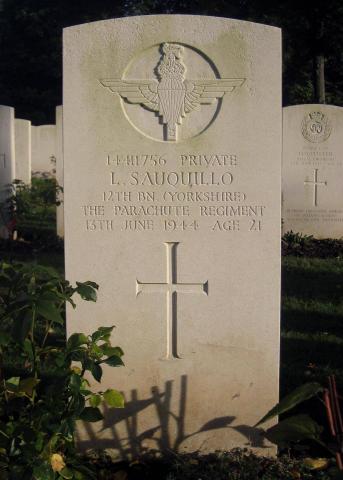Lucio Sauquillo was born in Aretxabaleta (Gipuzkoa) in 1923 and was evacuated with Gabriel in the expedition of war children that departed from the port of Santurtzi to England on May 20, 1937, but was not claimed by his parents after the end of the Civil War, who had been exiled in France. So both boys stayed there, although they were separated.
The youngest, Gabriel, remained in the Midlands, forming part of an active group of 40 boys who met with some regularity to discuss their things, soon capturing the attention of the Basque representatives in London, who feared the proselytism that the Spanish republican authorities could exercise on this and other groups in the capital of the United Kingdom. with President Juan Negrín at the head. Instead, Lucius was sent to the north of the country, settling in Scarborough, Yorkshire. The Sauquillo family, well known in Aretxabaleta, was very committed to the left and had suffered harshly the drama of the war. His father had presided over the Republican center of the town of Alto Deba and his three older brothers fought on the Basque fronts in the ranks of the Dragoons battalion of the Unified Socialist Youth (JSU), of which one died in combat and another was shot.
In Scarborough, the pretty seaside village that has been a traditional summer resort for generations of Englishmen, he still had time to learn the electrician's trade and meet a girl named Annie Olive Agar before he joined the British Army, becoming the father of a child at 18, although the couple never married. According to his personal file, he enlisted on November 19, 1942 and made the basic instruction in the 19th of the Primary Training Corps in Edinburgh, from where, due to his training, he was transferred to the 100th Coy of the REME (Royal Electrical and Mechanical Engineers Corps), but the young Gipuzkoan was not willing to see the war from the rear, joining the Army Air Corps to be trained as a paratrooper on September 14, 1943.
His new unit would be the 12th Yorkshire, which had been organized during the month of May of that same year.
Lucio's body rests next to that of many of his comrades in the British cemetery of Hermanville and was memorialized by the Sancho de Beurko Association on a trip to Norman lands on the occasion of the 75th Anniversary of D-Day. A team from EITB, the Basque public television, approached there and Lucio's story reached many homes through the midday news.
Created by user 'Jungly'.
Read More

Latest Comments
There are currently no comments for this content.
Add Comment
In order to add comments you must be registered with ParaData.
If you are currently a ParaData member please login.
If you are not currently a ParaData member but wish to get involved please register.